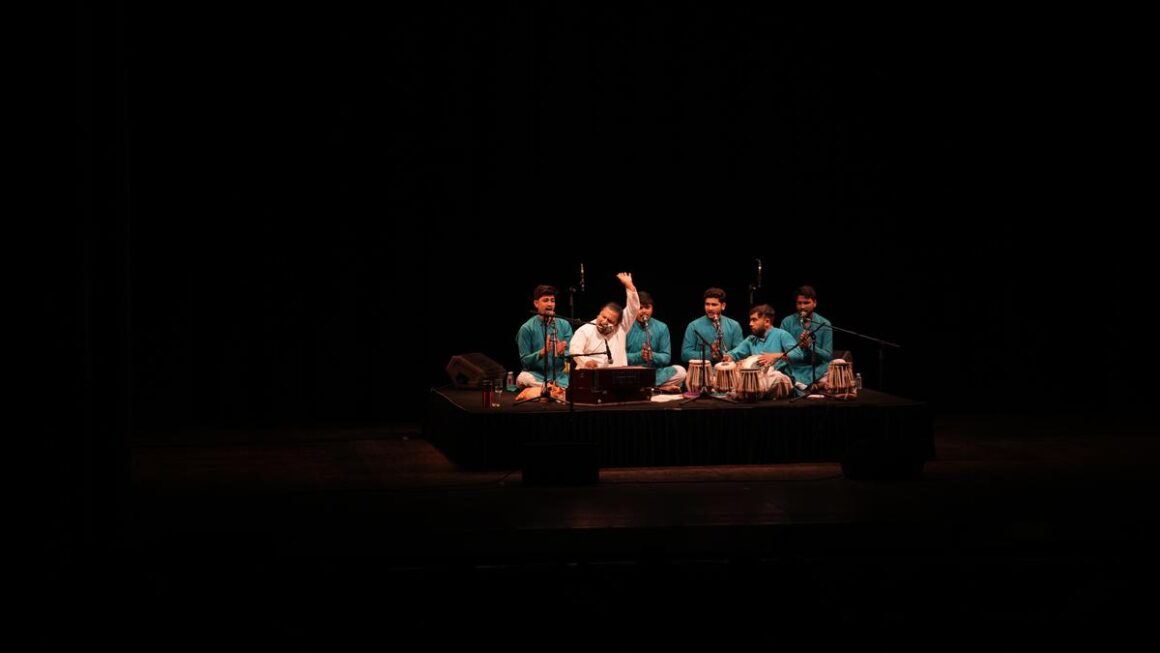
Rehmat-e-Nusrat performing at Royal Opera House in Mumbai
| Photo Credit: Special Arrangement
Sometimes tribute bands and impersonators have a following of their own. Their success lies in their ability to keep the memory and flavour of the original alive. So it is with Rehmat-e-Nusrat, a group hailing from the Kumaon hills in Uttarakhand, which specialises in Pakistani legend Ustad Nusrat Fateh Ali Khan’s songs.
At their first public show, a sold-out one at Royal Opera House in Mumbai last month, the group showed its natural flair for sufiana kalams. The first song went on for 25 minutes, yet the audience remained attentive. Many were familiar with the Sufi composition ‘Allah hoo’, popularised by Nusrat Fateh Ali Khan. They enjoyed the way it was presented by Rehmat-e-Nusrat — soaring vocals, energetic chorus, melodic harmonium and powerful tabla accompaniment and rhythmic handclaps.
Though the duration was two hours, Sarvjeet and his team (Sanjay Kumar on the tabla, and Rohit Saxena, Shubham Mathpal, Anubhav Singh and Deepak Kumar on backing vocals and claps) performed for three and a half hours without a break, with majority of the audience staying on till the end. ‘Allah Hoo’ was followed by the well-known ‘Ae ri sakhi ‘, written by the great mystic Amir Khusro, and the Nirguni bhajan ‘Bhala hua mori ghagri phooti’. When the group rendered the devotional ‘Sanson ki mala’, it was greeted with rapturous applause. ‘Yeh jo halka halka suroor hai’ lasted 30 minutes but the fervour never diminished. Rehmat-e-Nusrat concluded with Khusro’s timeless ‘Chaap tilak’.
Signed up by Delhi-based Amarrass Records, the group has performed regularly in Delhi and Bengaluru, besides the Jaipur Literature Festival and Ziro Festival of Music in Arunachal Pradesh.
Interestingly, the same group sings Kumaoni folk melodies under the name HimaliMou.
Sarvjeet and his team also sing Kumaoni folk melodies under the name ‘HimaliMou’
| Photo Credit:
Special Arrangement
Sarvjeet hails from Almoda, north of Nainital in Uttarakhand, and was exposed to a lot of Kumaoni and Nepali music. His father was a government teacher who played harmonium as a hobby. The youngster began singing early, and won many school competitions. The turning point came when he heard a recording of Nusrat’s ‘Sannu ek pal chain na aawe’. He recalls, “I must have been 14 or 15 then, and my first impulse was to watch Nusrat ji’s perform live. It came as a shock when I found out he passed away in 1997.”
Sarvjeet spent a few years learning on his own the qawwalis by Nusrat and the Wadali Brothers. He says he realised the importance of imbibing the nuances of poetry and diction, and also familarising himself with ragas. “You need to know the meaning of the words, and express them with the right emotion,” he adds.
His father wanted him to become an aeronautical engineer, but at 16, the young singer decided to leave home and teach music and art in Pantnagar. Later, he travelled around to meet singer Pooran Chand Wadali and Manganiyar artiste Fakira Khan. He formed Rehmat-e-Nusrat in 2014, choosing talented and passionate youngsters, but it took them six years to be recognised.
When Ashutosh Sharma of Amarrass Records met Sarvjeet, he thought the group would only do folk music. He was surprised their main focus was qawwali. Besides shows, they are associated with the Amarrass Musical Tours.
In contrast to the sheer energy of Rehmat-e-Nusrat, the music of HimaliMou is more restrained . It features Kumaoni hill songs known as jhoda (songs for working classes), niyoli (songs of separation) and chapeli (tunes for dancing). The harmonium and different types of wooden flute provide the melodic accompaniment, and the dholak and hudka hand drums provide the rhythm, along with handclaps.
Whether it is qawwali or folk music, Sarvjeet believes in maintaining purity of tradition.
Published – September 30, 2024 03:28 pm IST


Leave a Reply